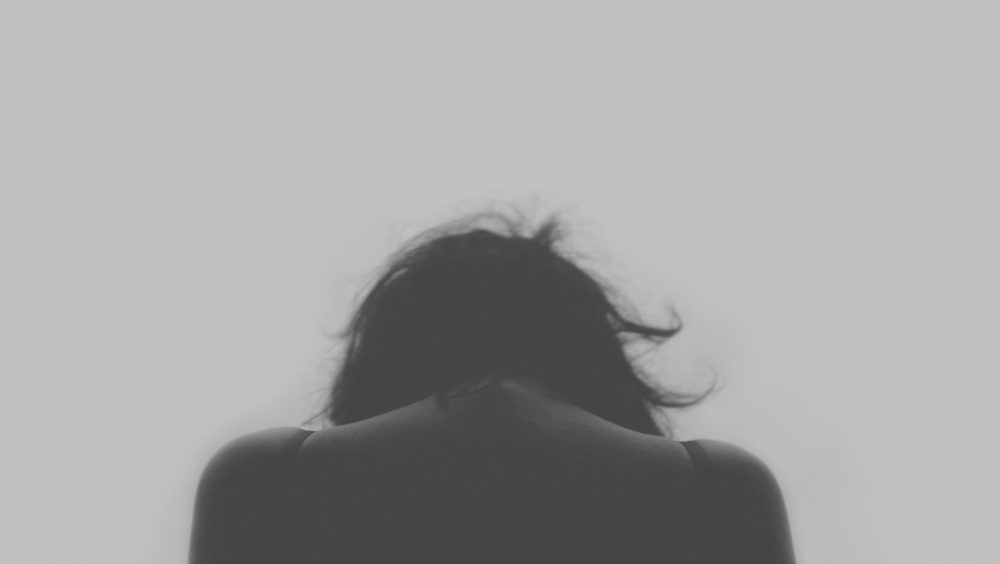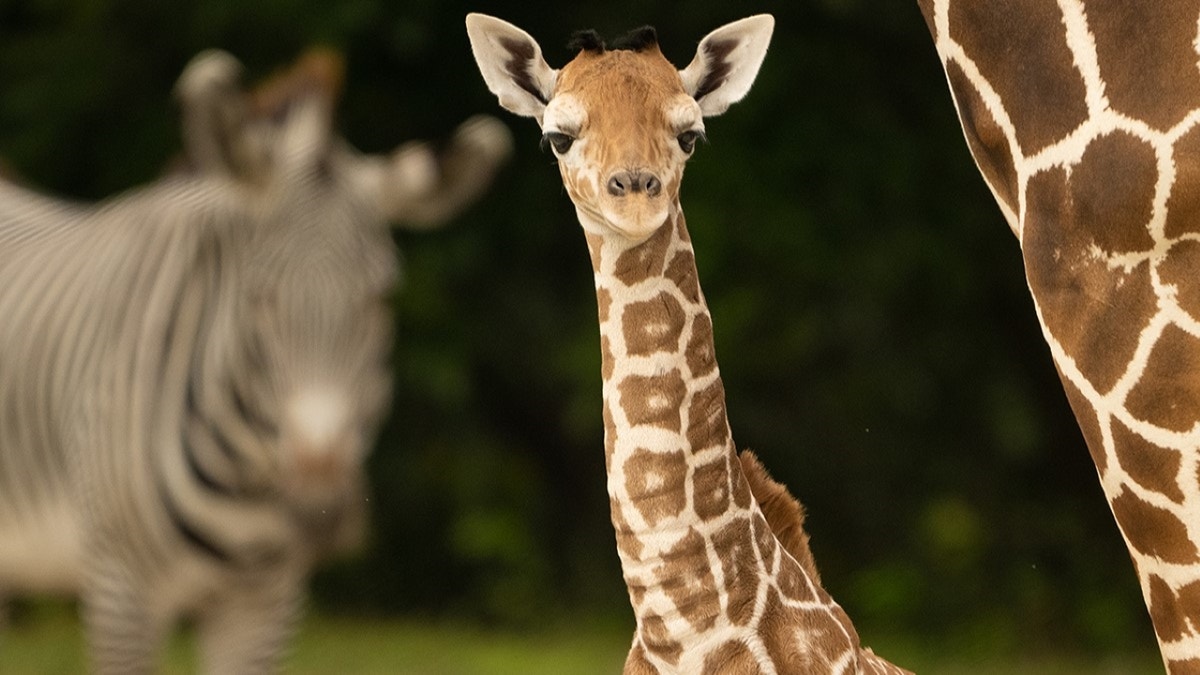Possess Me, Demon, Please by Alexandra Dos Santos
With swollen eyes, I sit before a group of 18-20 somethings. The air is tense, dead silent. They stare at me expectantly, waiting for the train wreck to begin. I curse myself for not wearing more makeup to cover my humanity. They can see I’m struggling, can’t they? Last night I ugly-cried myself to sleep. My situationship and I broke it off, and my mom is dead. The latter isn’t new, but the former, like most young adult woes, is something I would’ve turned to her for. How inconsiderate of my brain—to keep me awake for all but one hour before I had to get up to plan the day’s lesson. As a college adjunct with two other jobs, I didn’t have much of a choice.
I click around Outlook, pulling up a PowerPoint on thesis statements. My mouth dries and armpits gush. Even with two layers of deodorant, my top is soggy. When it’s time to start, the small, anxious self who wants to run out of the room leaves my body, making room for The Teacher to possess me. She opens her mouth. I have no idea what she’s going to say.
Nobody wants to be possessed. The word alone speaks to the horror of helplessness—the victim’s inability to control their own body and thoughts, at the mercy of something that delights in causing pain. Demons make possession look easy; they slip under a host’s skin, infectious and contagious as the flu.
In The Exorcist, Reagan accidentally conjures Pazuzu using a Ouija Board. She doesn’t know what’s going to happen to her—that once inside, the demon will grow and expand until it bends her into back-breaking angles, forces her hand to stab her own flesh with a crucifix, vomits green goo. This is how we picture possession: a narrative where outside spirits are evil, and our solid selves, our flesh and blood, are good. The idea is that once a demon is exorcized, we’re relieved to return to our old life. Like we’re all too happy in it. Like we aren’t suffocated by our own skin.
But unlike demonic possession, the kind of possession I’m talking about requires practice. It isn’t something that binds itself to you through an occult item; it’s something you summon all on your own. Before I allowed myself to be possessed by The Teacher, being the center of attention made my blood run cold. As a kid, I watched my mom orchestrate a classroom with ease and fantasized about doing the same. But that wasn’t me. My whole life, I rushed to say my piece before the other person inevitably zoned out and turned away. I took up jobs and hobbies that allowed me to stifle my voice, hiding behind the curtain or a computer screen so I’d never have to see those bored, judgmental faces. You are who you are, I’d tell myself. Accept it.
But even after years of trying to forget about teaching, it still called to me. So, at twenty-five, I left my desk job and taught my first class, English 101. To say I was scared at the podium is an understatement. I’d suffer panic attacks, stifle nausea. I never ate. Without fail, something would happen every class to validate my biggest insecurities: that I’m stupid, unqualified, and in over my head. Add a devastating break-up to the mix, and I was basically a walking breakdown. After that first semester, I needed to regroup. I couldn’t keep living like this. Something had to change.
Unlike demonic possession, the kind of possession I’m talking about requires practice.
“Just think of it as doing your work,” another adjunct said when I confided in him. “Treat it like something you have to get done. A task.”
I liked the advice; it had notes of compartmentalization, disassociation. I wanted to teach. That much was clear. I wanted to share my love of stories and words, connect with those who were struggling, get my students excited about learning. But there was something standing in my way, and that was capital m Me. I wanted to tell that insecure voice in my head to shut up, but that wasn’t drastic enough. I wanted her to exit altogether—to slip out through my pores and leave an empty shell behind to be filled with something, someone, greater.
I’d been possessed before. Why not do it again?
The first time I was possessed was back in 2019, the year I worked at an office by day and haunted house at night. I was lonely post-college graduation: suffocated by the nine to five, drained from the packed commute on the Long Island Railroad, and out of character every time I had to use corporate lingo. The fun habit I’d picked up in undergrad, day drinking, was no longer socially acceptable. Working people drink at Happy Hour, so they have something to look forward to all day. So I drank Twisted Tea on the railroad home with a commuter friend. I drank at dinner, finishing off bottles of wine at home. I was still living with my mom, whose cancer was getting worse before my eyes. We bonded over wine and cocktails at first, a bittersweet milestone where the child is no longer a child and can meet the parent on the same adult plane of a buzz. But as time went on, I moved from having casual drinks after work to drinking cheap vodka in my room, hiding it from my mom and romanticizing the physical pain it caused in my throat and gut. I’d ritualize it, too, playing the song “Altar” by That Poppy every time I took the first drink. The song had no deep meaning for me; it just stuck after the first time, becoming a summoning bell to get obliterated. Looking back, using a song of that name to mark my transformation is so on the nose it almost seems made up. As the music’s shiny, plastic optimism jammed in the background, I torched the insecure voice in my head—burning it to ashes to make room for The Addict.
Addiction begins as a possession closer to the demonic infestation kind. First, there are signs—scratches on the skin, knocks on the wall, shadows in the corner—that darkness is closing in. It dances in your periphery, creeping a little closer each day until it opens the door of you wide, inviting more of its own kind in. A demon needs a body to exist in our world, and so does addiction. That’s why they both sit in wait for the vulnerable: the grief-stricken, the lost, the genetically inclined. If addiction was Satan, then shame was Beelzebub: the second demon in command, the two of them fueling each other in an endless loop. There were others, too: hopelessness, numbness—more to join addiction’s hoard, swarming fresh meat. In The Bible, Jesus exorcizes a possessed man, driving the demons into swine. When they speak through the man, there is a contradiction of identity, a telling confession: “My name is Legion, for we are many,” (Mark 5:1-20).
Soon, anything I did sober felt wrong: dating, seeing friends, cooking, skateboarding, doing my hair, going to the beach, riding a train, sitting down, standing up, walking, breathing. If I wasn’t on something, I felt like an imposter. At work, light-hearted banter was like a foreign language to me. I couldn’t crack the code on my colleagues’ comfortability and was convinced they only kept me on because hiring a new assistant was a glacial process. When I got out of work, I wanted to forget my feelings of ineptitude. I would pull out that magic potion and down it to banish the day. The Addict would hang around in her vague fog with no real purpose other than relief. I liked handing over control. I liked not thinking for a while.
My high tolerance led to weight gain and general ill health, worsening my already terrible anxiety. I didn’t recognize myself: with my watery eyes, red face, empty expression. It horrified me, so I stopped looking in mirrors. The only thing that made me feel better was the thing that caused it all. When I gave into it, I felt like I became “myself” again. Like I’d woken up. The Addict simultaneously filled and drained me, another one of life’s contradictions. Two truths existing in one breath.
All I wanted to do was scream. If I could’ve peeled my skin off, I would have. A killer was living in my body. I was her, and I was her victim.
Around that same time, some friends told me about a seasonal haunted house that ran every year, and I decided to join. I needed somewhere I could behave as fucked up as I felt inside. It was a place where I could unleash my opposite, get far away from the imposter syndrome in my daytime life. I was even sick of my drunk self, who was affable and flirty to everyone else, and cruel to me. I felt a kinship with the haunters, who were all so unapologetic—weird, unpredictable, and funny. They expressed how they felt realer as the monsters they played than as who they were in the real world. I understood.
At the haunt, I was a sexless, uncontrollable thing. My character was a rag doll who’d been animated by a mad scientist or wizard or something (the plot-lines weren’t exactly airtight). I painted my face white with red cheeks, squeezed into a shabby coquette dress that’d been distressed with scissors and brown paint to look old. It reeked of last year’s sweat, but no one ever washed it.
That’s when I got my first taste of a micro universe, a place completely under my control. My only instruction was to not touch the guests unless it was an extreme haunt night. Otherwise, what went on inside was entirely up to me. My room was the first in the haunt, with a rounded corner and small stage running alongside it. The combination of a blaring music box soundtrack, sauna-level temperature, and infrared lights made it feel like a fever dream. When I heard my first guests approaching, I ran to crouch behind the stage’s musty curtain. My mind went blank with fear; I hadn’t thought of what I was going to do. A half-ass performance would only make things more humiliating. I had to do something, and do it fully. So I closed my eyes and jumped.
I’d been possessed before. Why not do it again?
I leapt off the stage in front of guests, literally bouncing off the wall from the momentum. Splinters from the cheap plywood stabbed my skin; my muscles burned from knocking around. The physicality—quite frankly, the pain—dug me a deep ditch into the present moment. The wilder I got, the louder I laughed and screamed and accidentally misted guests’ faces with spit, the more I shifted into a flow state. When I put on the costume and makeup, I could make people run, turtle shell into their necks, cringe, scream. I could make them see me—or see someone, anyway. The invisible veil that divides and protects strangers had no power here; I tore it apart with my teeth.
During those nights, it was like The Evil Doll took over. Alexandra was gone, off somewhere in a deep sleep, waiting for her alarm to sound come Monday morning. I tried my best to be invisible during daylight hours. At the office, there was no costume or set to hide behind, no Evil Doll I could yield to. I’d apologize for mistakes, cry in the bathroom stall, stumble my way through cheery small talk. If haunting was a flow state, then office work was the opposite: a locked room of self-monitoring, where I had to whip myself to behave. I couldn’t let anything too real slip out. At the haunt, my laugh was as cathartic as a scream; I’d clench my stomach, constrict my throat, heave the sounds out. An expression of liberation, madness, or both. The Evil Doll knew this well.
It was in tune with the physical realm—so much so that when she possessed me, I never inhabited it more. Splits, high kicks, crawling, running, punching walls, pulling out strands of my own hair. Weekend nights were The Evil Doll’s time to slip beneath my skin, open my mouth, and gasp a breath of relief. It was a ritual, a summoning come the time I clocked in, and a banishing the time I clocked out. But when the haunt ended, The Evil Doll didn’t want to go so easy.
Without the proper outlet, it morphed into a darker, vindictive creature that loved to torture me now that it had no one else to inflict that power over. Merged with The Addict, it really did feel like a full-on demonic possession. Every place felt the same drunk. Nothing differentiated a depressed night drinking wine on the couch from a fun birthday celebration. My addiction was a moving room: a set state of existence that in truth was just as boring as it was painful.
The final straw was a horrible New Year’s Eve: I was in an Uber, heading home from the party I left early because I was already sick. Slumped against the window’s cold glass, the blur of the car’s radio cleared in my ears just in time for the three, two, one, Happy New Year! It felt like a bad omen, God pointing a finger at me and taunting, “This? You want more of this in 2020?”
The hangover and depression were so unbearable the next day, death felt preferable. Terrifying thoughts whirred around me, along with the spinning room. My mom, who’d left my dad because of his own alcoholism, watched me writhe. I didn’t feel comfort in her presence. Not in anyone’s or anything. Alcohol had utterly isolated me.
For a long time, I’d known I was spiraling but couldn’t say it out loud. I couldn’t even think it. A demon’s name holds all of its power. It will lie to you, tell you something else to misdirect you. Because once you have its name, you can command it out. That day, I named my demon for what it was, so I could send it back to hell. I decided to get sober.
The abyss demanded to be looked at, so I did. Without alcohol, I literally didn’t have a choice. I didn’t think I’d make it past the first week, let alone month, but somehow I kept going. Sobriety was like a drug of its own. It lit me on fire in a different way, an intense form of exposure therapy—and the thing I was exposed to was myself. The withered, neglected self, who never dared speak up before. When had I started beating up on her, and why?
Maybe there was some power in being the abuser, the first to the punch before anyone else could knock me down. In truth, I was confused: about where I was going in life, who I was, what I wanted. When the pandemic began a few months later, my external circumstances aligned with my internal, and the deep work of recovery began. There was nowhere to run, no distractions to be had during lockdown. The world would come to look like my insides: icy and separate and scared. Once I made it to the three-month mark, I developed a bit of self-trust. But there was also a new fear: that one day something would snap inside me, and I’d have no control over picking up and drinking again. That all this would be for nothing, and I was doomed to repeat the same patterns for the rest of my life. What possession movies don’t show is the victim’s struggle after the demon’s been exorcized: how parts of the newly unpossessed body become suspect, and their own minds feel unsafe, like a house with broken locks. The demon got in once—what’s to stop it from happening again?
There’s this saying in recovery that everyone knows: One day at a time. It sounds so simple, but it really does take the pressure off. I didn’t need to fix my entire life; I just needed to do my best that day. And days accumulated, with transformations so small, I almost didn’t see them until I looked back at how far I’d come. When I was sad, I didn’t give in to the demon’s call to get blackout drunk, burying that fragile inner voice’s cry for help. That voice told me exactly what I needed to do, what I knew deep down without all the bullshit excuses. It got stronger—strong enough to talk me down from taking that shot of vodka at 2 a.m. in my moonlit kitchen. That voice wanted the best for me, because it was me. She’d been there all along; I just couldn’t hear her.
This strength came in handy a couple years later when my mom passed away. At her wake, which I filled with colors and music and all the things she loved, there was a champagne toast. I remember that temptation. I considered joining it, wanting to be a part of this ritual just this one time, and that would be it. Then I remembered all the horror stories I heard in recovery groups. It’s never just one. The first drink is the incantation, the invitation. It calls to the legion of more, making it incredibly easy to find me. Maybe I could fight them off, but I wasn’t positive I could. I didn’t want to get possessed at my mother’s funeral, not after coming so far. So instead, I walked away. Out into the fresh air and sunlight.
When I stopped running from myself, I was able to do what my mother wanted for me: to live an authentic life, to follow my heart. I was in a loving relationship for the first time, and I was getting an MFA, which I would have written off a waste of money had I not seen how quickly life dissolves—and all your dreams along with it. Death I had no control over; life I did. But there was one major thing left: teaching. I decided to do what terrified me and inspired me the most, which was getting in front of a room and demanding attention. No liquid courage, no props. Another thing I learned in recovery: Feel the fear and do it anyway.
A demon needs a body to exist in our world, and so does addiction.
In 2023, I taught my first class. That blue-flamed burning I felt when resisting a drink or speaking in a Zoom meeting was amplified by one hundred before the start of each class. But I couldn’t leave—these students trusted me. It was the same kind of surrender to the moment that I’d practiced in so many other aspects of life. I thought back to the haunt: how I managed to command a room full of people without all that thinking getting in the way. How at the best of times, I banished fear and invited flow.
Only recently, in my second year of teaching, did it finally click: I needed to channel The Teacher. The one who was the stability, not the chaos. That trusted figure who leads students through a portal to another world—a liminal space in the pocket of their day where they could make mistakes and discoveries, like Virgil guiding Dante through Inferno. I wasn’t quite ready to do this on my own. But if I was just a vessel, a means through which a lesson could be taught—that I could believe.
I’m tempted to say that The Teacher was really me all along, that possession is just a useful metaphor to describe finding my confidence. But I don’t quite believe that. I don’t think possession deserves to be banished to the land of ideas—useful for analogies and scary stories, but not part of the real world. It’s rare to consider this and not cite religion or psychology. But possession exists outside of these contexts, too; it’s not just part of some doctrine, or only a symptom of a mental illness to be cured. There are ways we can interact with the world that honor all that we don’t know: the invisible forces living among us that, when acknowledged, grow stronger, and help us do the same. When I ask The Teacher to take over, I don’t do it just to hype myself up. I genuinely step to the side. I’m checking out, going home, and letting someone else do all the hard work for me. It almost feels like cheating. But she loves it, and I have stage fright, so why not? We don’t always have to be our own heroes; we don’t have to inhabit our bodies alone.
I come to in the middle of a sentence. I’m in front of the class, wondering how I got here, like a sleep walker waking up in a field. A lot of things can banish The Teacher prematurely—a tech issue, a spilled drink, a sudden discovery that my fly is unzipped. This time, it’s an iMessage that pops up on my laptop: the situationship is asking to hangout later. A freeze rises from my gut, but I close my laptop and try to carry on anyway, wondering if the students know that a completely different person sits before them now. Somewhere in that split second, The Teacher did an Irish goodbye, abandoning me with ten minutes left of class.
“I’ll let you guys out early,” I say. And like the many spirits soaring in and out of me, the students pour out of the classroom. I sit there for a minute, empty vessel in empty vessel, and smile at the abyss.


























































